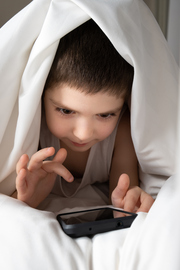Can Social Media Impact Children’s Brain Development?
Social media has become an integral part of our lives and it’s no surprise that children are exposed, too. Major platforms like Facebook and Instagram capture children’s attention, inundating them with content and overstimulating sights and sounds. With that, it shapes their social interaction and daily routine.
The Impact of Toxic Stress on Brain Development
Stress is a natural response to challenging situations. When experienced chronically, it can harm children’s brain development. The developing brain is susceptible to stress and prolonged exposure to various stressors can disrupt normal functioning and growth.
Chronic stress negatively affects cognitive abilities and emotional well-being in children. Toxic stress has a lasting impact on brain development and function. The possible changes to a child’s brain might lead to anxiety, addiction and depression.
Another study published in the Journal of Neurodevelopmental Disorders found that early life stress can lead to changes in the structure of the amygdala, prefrontal cortex, hippocampus and hypothalamus. These changes also make someone engage in risky behaviors and addiction.
The Connection Between Social Media And Children’s Brain Development
Social media exposes children to vast amounts of information, social interactions and stimuli that can shape their cognitive and emotional development. Excessive screen time and social media usage can negatively impact children’s mental and emotional development.
The constant exposure to screens and digital work may contribute to attention difficulties, reduced focus and impaired cognitive abilities. Moreover, social media’s curated and filtered nature can distort children’s perception of reality and affect their self-esteem and emotional well-being.
A study published in JAMA Pediatrics found a significant association between increased screen time and lower scores on developmental screen tests in toddlers. The results have indicated that children aged 24 to 36 months with higher screen time levels exhibited lower performance on a screening measure that evaluates their achievement of developmental milestones at 36 and 60 months.
Emotional and Social Effects of Social Media on Children
Social media can significantly influence children’s self-esteem, body image and social interactions. The constant exposure to carefully curated posts and images on social media platforms can create unrealistic standards of beauty and success, leading to negative self-comparison and diminished self-esteem. Moreover, the pressure to fit in and gain social validation online can affect the children’s sense of identity and belonging.
There are potential risks of social media. The dangers include addiction, cyber, exposure to harmful content, privacy concerns, mental health problems, sleep problems, eating disorders, reduced academic performance and reduced social interaction.
Cyberbullying and online peer pressure are prevalent. Social media allows people to be anonymous, which can encourage hurtful behaviors that lead to cyberbullying. The fear of missing out and the desire to conform to social norms online also contribute to peer pressure, where children may feel compelled to engage in behaviors they may not be comfortable with in order to fit in.
Many U.S. teens have experienced cyberbullying or witnessed others being bullied online. Common forms include mean or threatening messages, spreading rumors and being excluded from online groups. These findings emphasize the need to address social media’s emotional and social consequences.
Strategies for Promoting Healthy Social Media Use
Check out these steps for encouraging healthier and better social media usage among children:
- Set limits: Establish clear boundaries regarding how much time children can spend on social media. Be more proactive in determining which sites are good for them and which aren’t.
- Take breaks: Teach your children to be self-aware about their emotions. If they’re already feeling anxious or frustrated, it’s better to take a step away from using the gadget and walk around for a bit. Spending time in nature is shown to help relieve stress, so be sure to encourage outdoor activity.
- Be a role model: Make sure you show your kids healthy social media habits by being intentional about how you use them. Maybe that means not ranting on social media or not comparing yourself with what you see. It also means spending just the right amount of time.
Social Media Is Already Here
Social media offers numerous benefits, but it can also be harmful — especially if children are left unguided. Chronic stress, exacerbated by excessive social media use, can lead to cognitive difficulties and emotional challenges. It’s essential to have good strategies in place and find the perfect balance in using these tools.
 Author bio: Cora Gold is the Editor-in-Chief of women’s lifestyle magazine, Revivalist. She strives to live a happy and healthy life with her family by her side.
Author bio: Cora Gold is the Editor-in-Chief of women’s lifestyle magazine, Revivalist. She strives to live a happy and healthy life with her family by her side.
Follow Cora on Facebook and LinkedIn.




